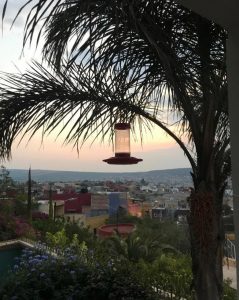When I was in my mid-twenties I lived for several years in southern Africa and worked as a copy editor and layout artist at The Rhodesian Farmer, a weekly farming magazine in Rhodesia’s capital, Salisbury. (The full story of how this unlikely scenario came to be can be found in my memoir Somewhere Child. I won’t go into it here.)
At that time, Rhodesia was considered the breadbasket of Africa. Its rich soil, ideal climate, and skilled farm workers made it something of a farmer’s paradise. And this magazine, The Rhodesian Farmer, was an important organ of the country’s farmers’ union, to which most farmers belonged.
One day, sitting at my desk, going over the galley proofs for the next issue, a man came into my office, head a bit bowed, holding his crumpled cloth slouch hat in his hands. The receptionist had sent him to see me because he was French, and among my colleagues I was the only one who’d studied French in school and remembered a few words. She thought I might be able to help him.
His name was Bernard, I learned that afternoon in our long and pleasant conversation conducted in our own version of Frenglish. He was a farmer, a quiet, unassuming bachelor, perhaps in his early forties. (He seemed old and weather-beaten to me then.) He had been traveling the world, he told me, looking for the right place to settle and have a farm of his own. He’d searched throughout Europe and gone further afield, visiting Australia, New Zealand, and other countries. None of them were quite right for him, he said.
He told me, in his quiet and deeply felt way – and this is why I remember Bernard so clearly even after fifty years — that he believed everyone in the world should be able to go anywhere in the world to find the place in the world where they felt they truly belonged. The country we’re born in should not own us, he said. The world is big, and we only live in it once. We should be free to explore it freely and live wherever we’re happiest, unhampered by government strictures and bureaucracies.
This thought had never crossed my mind before that afternoon, and it hasn’t left my mind since. Bernard the farmer had planted a seed.
Imagine, I often think, if more people were encouraged to think more globally and travel more widely – and not by just quickly rushing through other countries to sightsee but by remaining for a while to see if they fit: Learning the language, learning the history and culture, learning how to cook that country’s traditional dishes, learning the steps to their traditional dances.

Imagine also a world without border walls or barbed wire fences, where immigrants are embraced instead of chased, where nationalism is replaced by a new form of globalism with the ethos, “We’re all in this together.”
This may well be a wildly romantic notion, but I imagine this would result in far fewer wars and happier, healthier, more broadly minded people worldwide. It’s fun to imagine. But what would it take to make this happen?

Personally, I’ve learned that I’m happiest living where palm trees grow. So staying in or near my home state – New Jersey, USA, where palm trees definitely do not grow – would never work for me as a lifetime choice. I love year-round, sunny, sleeveless days and abundant, healthy, juicy tropical fruit (mangoes! avocados!). I loved Africa, and I felt at home there. I’m loving Mexico, and I am at home here.
As for Bernard, as I recall, he chose to settle in Rhodesia (now Zimbabwe). He bought a small farm and married an African woman, and, I like to think, lived happily-ever-after – or at least until that country’s civil war forced most farmers off their land and back to their countries of origin. But that’s another story.

Yes! The nation-state and the privatization of the earth’s resources, mostly by large corporations, isn’t sustainable. It certainly isn’t moral, given the catastrophic results that are evolving for most humans and the planet. And, as you point out, we all have “A Country Within” that is longing for its own special place in the world.
Thank you SO much for your input, dear Kim! I wholeheartedly agree with you. And I’d love for WOW readers to read your book, A COUNTRY WITHIN. It is so moving and meaningful. — xx
Bonnie ! This is your best ever, in my opinion. Such clear thinking and incredible perspective. More please.
Thank you, dear Jan! I appreciate your kind words so much. They keep me going. 🙂 I hope all is well with you.
Thank goodness, all is pretty great considering. Primarily, my daughter and family are happy and well and I see them frequently. (If you force me I’ll send you pictures). I’m quite an independent gal (long time widow) and have vivid memories of you, your style and especially your kindness despite your enormous popularity. I know from your writing you’re comfortable and happy in your life in SMA and that’s gratifying to know. Sending all good wishes and positive vibes your way Jan
Glad to know you’re doing well, Jan. It’s wonderful to be in touch after all these years (since grammar school?)! — BB
Beautiful story. Yes, palm trees are the best! Some people have planted them here in Southern NM. I may try!
Hola, querida Te! Yes, do try to plant some palm trees there. Wouldn’t they be fun to have around your house — to remind you of home? — Mucho love, BB xx
The description of “A Country Within” sparked my curiousity. I read the introduction on Kindle and hope to find the time to continue reading it. What an amazing opportunity and experience for Kim. We find aspects of ourselves when we are exposed to different cultures and we are given the opportunity to learn about the lives of these refugees, that are an unexpected discovery.
I’m like you, Bonnie. I thrive in the tropics like a hot house plant. Casual clothing and feasts of salads and exotic fruits. Once a year, when possible, I fly with my son and husband to the northern tip of Australia, where the rainforest meets the reef. They enjoy the fishing, but I soak up the lushness of the vibrant colours and the birdlife, each with their amazing sounds. Despite the fact that they have a “wet” season for 3 months of the year where it rains daily, I would love to live there permanently. The place attracts writers, painters and photographers, and the locals are friendly and unaffected by the dramas of the city. As soon as I step off the plane, a switch turns on within me. It is my country within. How lucky you were to meet someone like Bernard. Someone who doesn’t fit into a sterotype.
Dear Loula — I so enjoy your generous comments and your shared experiences. I can just see you on your holidays in northern Australia, soaking up the lushness! Yes, I feel lucky to have met Bernard. I feel that his spirit wanted me to write this true story of how he influenced me.
Dear Bon,
What a beautiful example of how a random meeting with a stranger can leave a deep impression that still resonates fifty years later.
Your message of all being in this together needs to be loudly shouted to fight the messages of hate being promulgated worldwide. People are daily encouraged to see others as the enemy, until it becomes so ingrained that they are unable to consider who actually benefits from such feelings.
Love,
Paul
Thank you, dearest Paul, for this. I’m reading Carson McCullers’ 1940 novel THE HEART IS A LONELY HUNTER right now, and one of the colorful characters in it, Jake, also agonizes over these issues. (The book is set in 1930s Georgia.) Finally, he moans, “What can we do? We can only keep telling our truth.” I really needed to read those words last night before going to bed!
Lovely thoughts.
Thank you, Lyn.
I’m commenting a second time, I see. Yes, this is what keeps me on the road — the idea that I am not just American. I am a citizen of the world, part of a very large family. I feel comfortable almost everywhere now. And it gives me hope when I realize people just want peace and security, and remember the number of times people have helped me and been kind to me.
Ah, Kim dear, I think I see the theme of your next book here! 🙂 Happy Trails! — xx